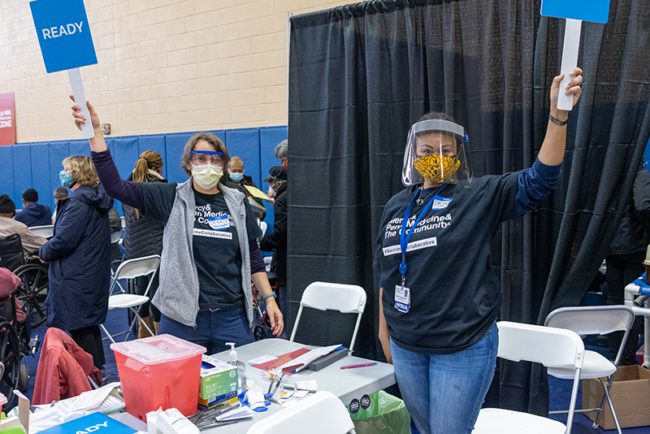On Dec. 16, 2020, the first-ever dose of the COVID-19 vaccine administered by Penn Medicine set off a cascade: More than 350,000 COVID-19 shots over the last year, with 200,000 administered in Philadelphia itself, provided a welcomed measure of security to Philadelphia residents, even as the threat of the coronavirus and its variants remain.
The year’s vaccine deployment efforts link Penn Medicine’s discovery science underlying the technology in the two mRNA vaccines to community outreach.
“We’ve known that the virus has struck hardest in communities of color, so we have focused on giving everyone the opportunity to protect themselves, their loved ones, and their neighbors. It has been a core tenet of our outreach from the beginning and remains critical as we move forward.”
Twelve months into the vaccination effort, the focus on health equity has led to tangible results, as Penn Medicine distributed more vaccine doses in Philadelphia than any other health system or nonprofit, with its ratios of vaccinations close to the city’s racial and ethnic make-up. Roughly one in 20 people vaccinated in Philadelphia received their shot from a Penn Medicine provider.

“It started with improving access and communication within our workforce, then quickly moved into reaching our communities in ways that reduced barriers to vaccination. As proud as we are of the past year, our commitment has to stay strong as we enter the second year of vaccination amid new worries about virus transmission.”
In a city where Black residents had the highest rates of infection, hospitalization, and death, Penn Medicine’s work provides insight for pursuing vaccine equity. Of the vaccines administered in Philadelphia so far by Penn Medicine, 38 percent (roughly 77,000 doses) went to Black patients. And according to city figures, 42 percent of all shots administered to Black patients in Philadelphia came from Penn Medicine. Just one entity, a commercial pharmacy, provided more. Penn Medicine also provided more than 12,000 shots to the city’s Asian-American residents, a number just behind a collection of commercial pharmacies and FEMA’s centralized mass-vaccine operation.
Read more about the playbook for equity in vaccine access developed at Penn Medicine, outreach to communities across the region, and more, in the full year-in-review news release and in the story from WHYY.







